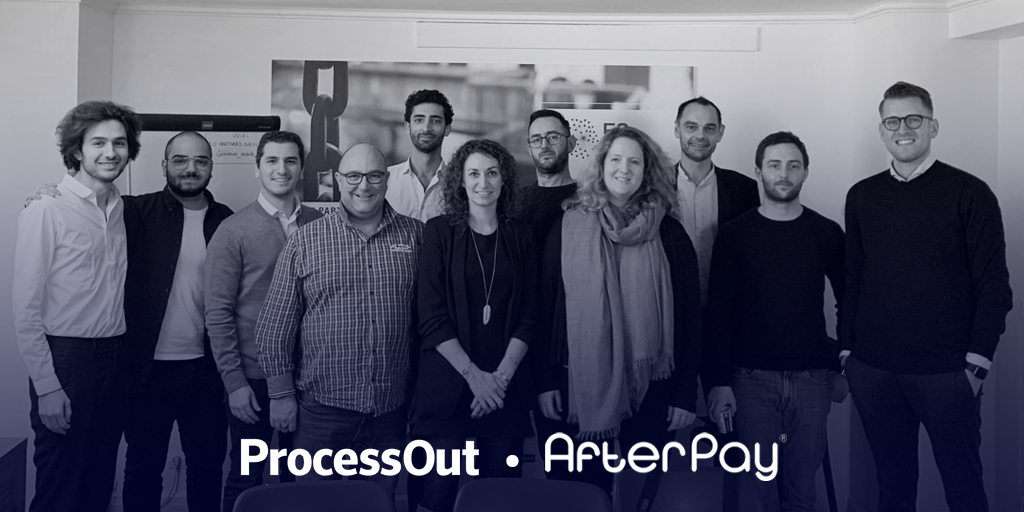Payment Market Insights: A Roundtable Hosted by ProcessOut & AfterPay
by Matthieu Couet on
On January 17th 2020, ProcessOut and Afterpay co-hosted a roundtable to share some feedback and insights on the current trends in the payment industry. This event was attended by some of the top French merchants’ payment experts.

As such, we would like to extend our deepest gratitude to Myriam Bourgeot from Vestiaire Collective, Mélanie Grignon from Dior, Yann Leclerc and Daniel Azogui from Carrefour - MarketPay, Nicolas Bosmans from Oui.sncf and Baptiste Guégan from Back Market for sharing their knowledge and expertise.
Below are some of the conclusions on key findings and best practices shared with us:
#1 Payment within organizations
- Payment is no longer considered a commodity but is now more often placed at the center of organizations and business models. Within the role of Payment Manager, creating internal stakeholders to assess your goals has become critical. Greater internal partnerships between payments, customer care, and marketing teams are becoming increasingly crucial in order to offer an outstanding customer journey.
- The biggest merchants are seeing a real ROI in building - internally or externally - a custom ‘payment hub’. They want their payment infrastructure to able to handle payment and fraud challenges with all the flexibility and the agnosticism that it requires.
- Some big players even decided to create their own infrastructure in a very unique way. Carrefour built a dedicated fintech - MarketPay - to address it’s payment challenges. MarketPay gathers technical solutions to offer acceptance and acquiring, and it also allows Carrefour to partner up with other merchants.
#2 When it comes to opening up in a new location
- In each different locations and countries, people have distinct habits and preferences when it comes to paying. Thus, it’s crucial to think of the future and the geographical expansion of your company when choosing your providers.
- Some APMs (Alternative Payment Methods) have a huge footprint on the market in specific areas. For example, ‘Pay-Later’ payment methods - meaning that the customer pays after the delivery - such as AfterPay, are currently covering 20 to 30% of the e-commerce business in Germany.
- Sometimes, direct connections with local APMs can act as leverage since it allows a company to not be dependent on just one gateway provider.
- The French market is starting to dig into Instant Payments. One point of friction seems to be the ability for solution providers to connect with the top 10 to 15 French banks. In this area, American Express has just launched its first instant payment solution and is now dealing with issuers.
#3 Building and handling your relationship with providers
- Having a good relationship with your providers is instrumental in enhancing your performance. A weekly communication (it can be PSPs, APMs providers, Acquirers, a Payment Orchestration Platform…) seems to be the minimum. However, in an effort to increase efficiency, time needs to be spent on reviewing your transactions first, only then can you contact them to make adjustments.
- The issuers are the main end-process pieces and a lot of leverage can come from that. For example, if you are a high-volume merchant, then you are in a good position to help them improve their fraud detection models on your specific pattern of transaction, thus at the same time improving your acceptance rate.
- However, it’s not always easy to get in contact with issuing banks. Some solution providers, such as Ethoca, can be good enablers on that matter. Payment Orchestration Platforms, such as ProcessOut, have relationships with a lot of stakeholders in the payment industry and can also serve as good connectors, including when it comes to being introduced to issuers. Certain Payment Services Providers (PSPs) have dedicated teams that deal with all the issuers – which is an option to consider as well.
#4 The power of payment data and the perspective of sharing it in the PSD2 framework
- Feeding issuers with payment data will likely be the most efficient lever to drive Strong Customer Authentication (SCA) exemptions. SCA is expected to bring friction in the customer journey, which in turn may have a significant impact on acceptance rates (on this topic, you can read our article about SCA exemptions).
- Opinions seem to differ on this topic, as feeding issuers with payment data can put them in a very powerful position. For some merchants, the more exemptions they can leverage the better it is, and they have no issue with feeding data in the SCA framework. But some merchants are not comfortable with this unilateral exchange of value. They underline the fact that issuers are not able to actually guarantee that the provision of this data will be beneficial to merchants.
ProcessOut is often hosting such events! If you’d like to take part in our next discussion, or just be kept in the loop, drop us an email at [email protected].
ProcessOut allows you to build, scale, monitor and optimize your payments through a unique API. We allow merchants to get connected to any PSPs / APMs / acquirers in one click and to optimize both their fees and acceptance rate thanks to a smart-routing technology
